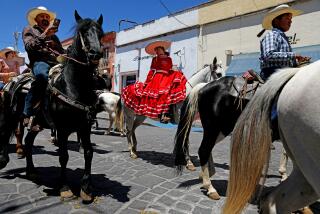Relatives in Mexico can only pray for miners
MOCORITO, MEXICO — Labor recruiters from Utah first came to the rural hamlets that surround this town in the western state of Sinaloa two generations ago, with promises of dollars to be made digging deep into the earth.
Onesimo Payan Carrillo, a retired miner, remembers them as “really tall, really blond men” who persuaded him and many others to leave their cornfields for U.S. coal mines.
The bond between this corner of Sinaloa and Utah has remained alive ever since, with sons and grandsons following in the footsteps of those first miners, including two young men who were trapped following the Aug. 6 collapse of the Crandall Canyon Mine near Huntington, Utah.
Two Sinaloa natives, Jose Luis Hernandez and Juan Carlos Payan, are among the six miners missing. A third missing miner is from the neighboring Mexican state of Chihuahua.
Rescuers said Wednesday that two devices detected some noise near where the six were believed to be trapped, raising a tiny hope that they might be alive. The source of the sound could not be identified.
Payan, 23, was born in Zapotillo, a village of 800 people outside Mocorito. His family home, a humble building of brick and corrugated tin, has been shuttered for years as he and his brothers sought their fortunes in Utah.
“As a young man, I worked in the mines too,” said Payan Carrillo, 70, who is Juan Carlos’ uncle. “What you make here isn’t enough to live. It’s a great tragedy that all this is happening.”
Zapotillo is a village with unpaved and unnamed roads, surrounded by corn and tomato fields withering under an unrelenting sun. Farmers in the region often make as little as $20 per week.
In Utah’s coal mines, immigrant workers earn more than that for just an hour’s work. As elsewhere in Mexico, the pull of such wages has caused Zapotillo to slowly empty. The village is populated mostly by women, children and the elderly.
“They leave looking for better fortune, in search of the green bills,” said Payan Carrillo, a dark-skinned man of weathered features. “But it’s very risky work. People don’t think about the risk.”
For days, Mexicans have been riveted by the story of the three compatriots trapped in the U.S. mine.
Zapotillo is too small to have a church. But every Sunday the faithful have been gathering at the village’s small chapel to pray. And during the week they have been lighting candles at the Payan Carrillo residence.
“I can’t even imagine the suffering of my nephew,” said Hortencia Payan, 56, Juan Carlos’ aunt. “I just hope God helps those poor young men and that soon they are rescued from that mine.”
Antonio Cruz, 66, has three sons working in the Utah mine.
“It’s a constant worry for me,” he said. “I told them, ‘Better to stay here and eat beans,’ but they didn’t listen.”
About 60 miles to the south of Zapotillo in the Sinaloa state capital of Culiacan, Hernandez’s aunts and uncles joined several dozen friends and other relatives Wednesday for the daily afternoon Mass.
His parents left for Utah last week to join the vigil outside the mine.
“Let us ask God that he be rescued soon, and that he may be reunited with his family,” Father Arturo Vasquez said as he led the Mass.
After the Mass, Marisela Hernandez Araujo, Hernandez’s aunt, said she had received a call from her son, who is also a Utah miner. He told her to “prepare the family for some bad news.”
“But we won’t give up on him yet,” Hernandez Araujo said. “That’s why we’re here at church.”
Hernandez’s friends and relatives said that the 24-year-old had a high school diploma and dreamed of going to college in Mexico.
“He never wanted to go to the mines,” said Jorge Aguilar, a former schoolmate who now works as a waiter. “Unfortunately, here there is no work. We don’t have options.”
Alberto Martinez Villa, 32, worked the night shift at the Crandall Canyon Mine, just like the missing men.
He returned to Sinaloa three weeks ago when his wife became ill.
“I’m still in shock over the news,” he said. “I think about what they’re going through, and it makes me want to weep.”
Still, Martinez Villa said he planned to return soon to the Utah mine, where he was making as much as $30 per hour. “People live well there,” he said.
His father owns about three acres of land in Zapotillo, but farm work pays poorly, he said. Three men working together might make the equivalent of $60 a week.
“It’s not the best work,” Martinez Villa said of the mines. “But it just pays so well.”
--
Sánchez reported from Mocorito and Tobar from Mexico City.
More to Read
Sign up for Essential California
The most important California stories and recommendations in your inbox every morning.
You may occasionally receive promotional content from the Los Angeles Times.











